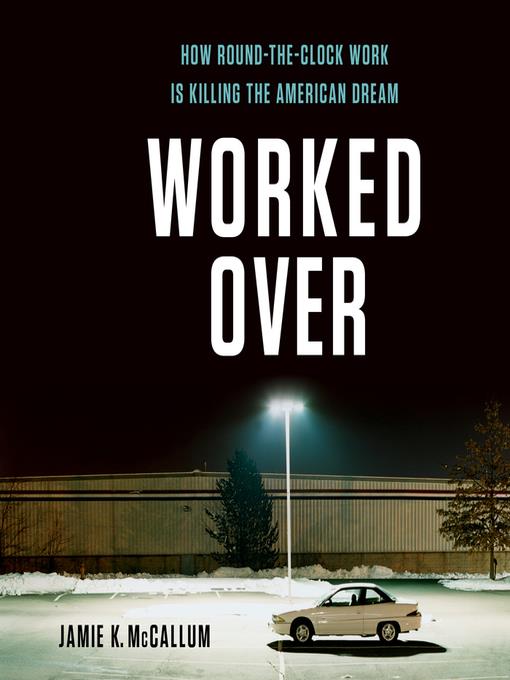
Worked Over
How Round-the-Clock Work Is Killing the American Dream
فرمت کتاب
audiobook
تاریخ انتشار
2020
نویسنده
Angelo Di Loretoناشر
Hachette Audioشابک
9781549104718
کتاب های مرتبط
- اطلاعات
- نقد و بررسی
- دیدگاه کاربران
نقد و بررسی

July 1, 2020
A sociologist warns that too many Americans are overworked or subject to soul-crushing tactics such as real-time electronic surveillance by their employers. McCallum may be the only social scientist who has worked as a longshoreman on the Seattle docks and marched in a picket line with the Exotic Dancers Union at the Lusty Lady peep show in San Francisco. Drawing on such colorful experiences as well as deep scholarly research, he makes the compelling argument that Americans are losing control of their work time. For generations, Americans saw hard work as a means to upward mobility, with strong unions to protect wages and hours and employers who managed workers' time by adopting the ideas of efficiency experts like Frederick Winslow Taylor and Frank and Lillian Gilbreth. That changed beginning in the 1970s. As union power waned and wages fell or stagnated, a new idea took hold: Work was good for you. What mattered was following your "passion," not decent wages or hours. At the same time, new electronic tools allowed companies to manipulate workers' time in ways that had especially harsh consequences for low-wage earners, including giggers and taskers like Uber drivers and Instacart shoppers, who were often left with too much or too little work time or unstable schedules. McCallum describes giant screens at Disneyland that showed workers' names in real time--and who was (and wasn't) meeting productivity goals--and a scheduling algorithm at Target ("Walmart for liberals") that doles out shifts that can vary so much, employees can't arrange child care or supplement meager pay with second jobs. Archcapitalists may be put off by the socialist-inflected remedies McCallum proposes, but few will disagree with his conclusion: "Free time is an objective good in and of itself, and workers clearly deserve more than they're currently getting." A sobering analysis of quasi-Orwellian tactics that permeate American work life.
COPYRIGHT(2020) Kirkus Reviews, ALL RIGHTS RESERVED.

July 6, 2020
Middlebury College sociologist McCallum (Global Unions, Local Power) delivers an informative examination of the strains placed on American workers by “overwork, unstable schedules, and a lack of adequate hours.” Linking decreased unionization to rising income inequality and work hour instability, McCallum notes that in the past 40 years, “CEO pay soared by an inconceivable 1,070 percent, and productivity increased by 70 percent, but hourly wages of average workers limped forward just 12 percent.” The “gamification” of work has exacerbated the situation, according to McCallum, who notes that Target (“a.k.a. Walmart for liberals”) uses color-coded screens to display the productivity rates of checkout clerks in real time. He also contends that a cultural shift toward expecting one’s job to be meaningful and fulfilling has made it harder for workers of all stripes to maintain a healthy work-life balance. His suggestions for reform include increased family and medical leave, across-the-board working hour reductions, and Medicare for All. Interweaving anecdotes from the history of American labor with profiles of contemporary workers, union organizers, and social service administrators, McCallum lucidly explains how the current system came to be and offers hope that the resurgence of socialist principles can lead to improved working conditions. The result is a cogent, persuasive, and witty call for change.

August 1, 2020
Sociology professor McCallum (Global Unions, Local Power, 2013), explores the challenges of today's workforce by exposing the false promises of meritocracy in America. McCallum reframes the "American Dream" belief by proposing new economic and political systems that aim to reduce inequality and support workers with shorter and more stable working hours. Drawing on sources like newspapers, government reports, labor statistics, and interviews, McCallum weaves various perspectives from frontline workers, managers, policymakers, union organizers, and technologists to illuminate the crises of today's workforce. Neoliberalism, a concept for free market trade and deregulation, has exacerbated and accelerated economic inequality in America. McCallum explains how work in America has fundamentally shifted our thinking and priorities and argues how society can rectify and democratize the workforce to be equitable and just through collective practices and movements. Readers interested in labor politics and relations and political economy will be engaged by this thought-provoking look at the systemic problem of overworking in America caused by poor economic infrastructures and unethical expectations.(Reprinted with permission of Booklist, copyright 2020, American Library Association.)

August 14, 2020
Sociologist McCallum's latest work (after Global Unions, Local Power) stands out among a spate of recent books about the dismal conditions of workers by offering a unifying focus on employees' loss of control over their jobs. The author specifically deals with the tension between employers' increasing demand for productivity and workers' need to maintain (or regain) control over their own time. McCallum's book is rich with examples of middle- and working-class responses to job-related time pressures. A few cases seem quirky (1973 astronaut in-space strike or a strippers' union protest), but even those fit well with his theme that workers without control over their time will, too often tragically, buckle under the conditions or, through remarkable effort, resist. The author traces the rise of modern time control to the early 20th-century managerial revolution that increasingly employed surveillance and technology to demand worker efficiency. Mid-20th-century labor movement focused on wages and benefits rather reclaiming time. Fragmented organized labor and emphasis on individual satisfaction through intensive work dominated the late 20th century. A well-focused chapter on changes in the welfare system reveals the role of government in demanding workers' time. VERDICT Subtly drawing on classic Marxian theory that capitalism steals laborers' lives as well as their work, McCallum's book will find a welcome audience among those concerned about global working conditions.--Charles K. Piehl, Minnesota State Univ., Mankato
Copyright 2020 Library Journal, LLC Used with permission.

























دیدگاه کاربران